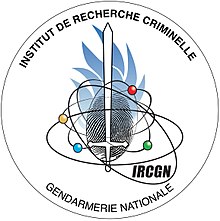
The GIGN is the elite police tactical unit of the National Gendarmerie of France. Among its missions are counterterrorism, hostage rescue, surveillance of national threats, protection of government officials, critical site protection, and targeting organized crime.

Law enforcement in France is centralized at the national level. Recently, legislation has allowed local governments to hire their own police officers which are called the police municipale.

The National Gendarmerie is one of two national law enforcement forces of France, along with the National Police. The Gendarmerie is a branch of the French Armed Forces placed under the jurisdiction of the Ministry of the Interior, with additional duties from the Ministry of Armed Forces. Its responsibilities include policing smaller towns, suburbs and rural areas, crowd and riot control, and criminal investigation, including cybercrime. By contrast, the National Police is a civilian law enforcement agency that is in charge of policing cities and larger towns. Because of its military status, the Gendarmerie also fulfills a range of military and defence missions. The Gendarmerie has a strength of around 102,269 people.
The Djibouti Premier League is the highest division in association football in Djibouti. It was formed in 1987. ASAS Djibouti Télécom is the most successful club in the Djibouti Premier League, having won a total of 7 championships.
The Djibouti Cup is the premier professional association football tournament in Djibouti.

As in many other countries with a French colonial heritage, law enforcement in Benin was a responsibility primarily shared by a military police gendarmerie and a civilian "National Police." However, in January 2018, these forces were merged into a single force called the Republican Police of Benin.
The law enforcement agencies of Madagascar include:

The Gendarmerie Nationale is the national gendarmerie of Niger. The Gendarmerie Nationale are under the Niger Armed Forces and report to the Ministry of Defense. They are responsible for law enforcement in rural areas. Niger's civilian police force, the National Police, is a separate agency under the Ministry of Interior, Public Safety and Decentralization, and are responsible for policing in urban areas.
Responsibility for law enforcement in Togo is primarily shared by the Police Nationale, the civilian national police, and the paramilitary Gendarmerie nationale togolaise.

Law enforcement in the Democratic Republic of the Congo has historically been focused on furthering the state's aims with no regard for human rights. The Police nationale congolaise is the police throughout the territory of the Democratic Republic of the Congo. It was composed of between 110,000–150,000 officers as of 2010.
The law enforcement in the Republic of the Congo is monitored by two organisations Congolese national gendarmerie and the Congolese national police.

The Académie militaire de la Gendarmerie nationale, literally the "National Gendarmerie Military Academy"), the French Gendarmerie nationale officers school, was created in 1901 and is based in Melun. It trains and teaches military officers who enter the officer corps.

The National Police is the national civilian police force of Niger. The National Police are under the Ministry of Interior, Public Safety and Decentralization and report to the General Directorate of National Police. They are responsible for law enforcement in urban areas, the protection of government buildings and institutions, and the security of government leaders. Niger's gendarmerie, the Gendarmerie Nationale, is a separate agency under the Niger Armed Forces, and are responsible for policing in rural areas.
The Gendarmerie Nationale, is the national gendarmerie force of the People's Democratic Republic of Algeria. As part of the Algerian Armed Forces is commanded by a major general who reports directly to the Minister of National Defense. It was created in 1962 by Decree No.019-62 of 23 August 1962 shortly after its independence. In 2012 the gendarmerie consists of 130,000 personnel. Although generally regarded as a versatile and competent paramilitary force, the gendarmerie has been severely tested in dealing with civil disorder since 1988. It frequently has lacked sufficient manpower at the scene of disorder and its units have been inadequately trained and equipped for riot control. The gendarmerie, however, has demonstrated the ability to root out terrorist groups operating from mountain hideouts.

The National Defence Medal is a French military decoration. It was created by Charles Hernu, Minister of Defence and established by decree on 21 April 1982. It rewards particularly honourable service rendered by military personnel for their participation in operational activities. The medal has three levels: Gold, Silver and Bronze.

The Tunisian National Guard is the national gendarmerie force of the Republic of Tunisia and separated from the Tunisian Armed Forces.
The Gendarmerie nationale Togolaise is a branch of the Togolese Armed Forces. Its 2,710 gendarmes protect people and property in rural areas, control roads and communications and contribute to provide assistance to the population in emergencies.

The National Gendarmerie of Gabon is the national police force of Gabon responsible for law enforcement in Gabon. It is under the direct command of the President of Gabon. The Gendarmerie is also in charge of the Gabonese Republican Guard.
The Maréchaussée were corps of soldiers in the armies of France initially put in charge of military policing and justice during the Middle Ages, and later extended to civilian responsibilities. They gradually coalesced into a police force with jurisdiction over the whole population on almost the entire territory of France. They retained powers of extraordinary justice until the French Revolution.











